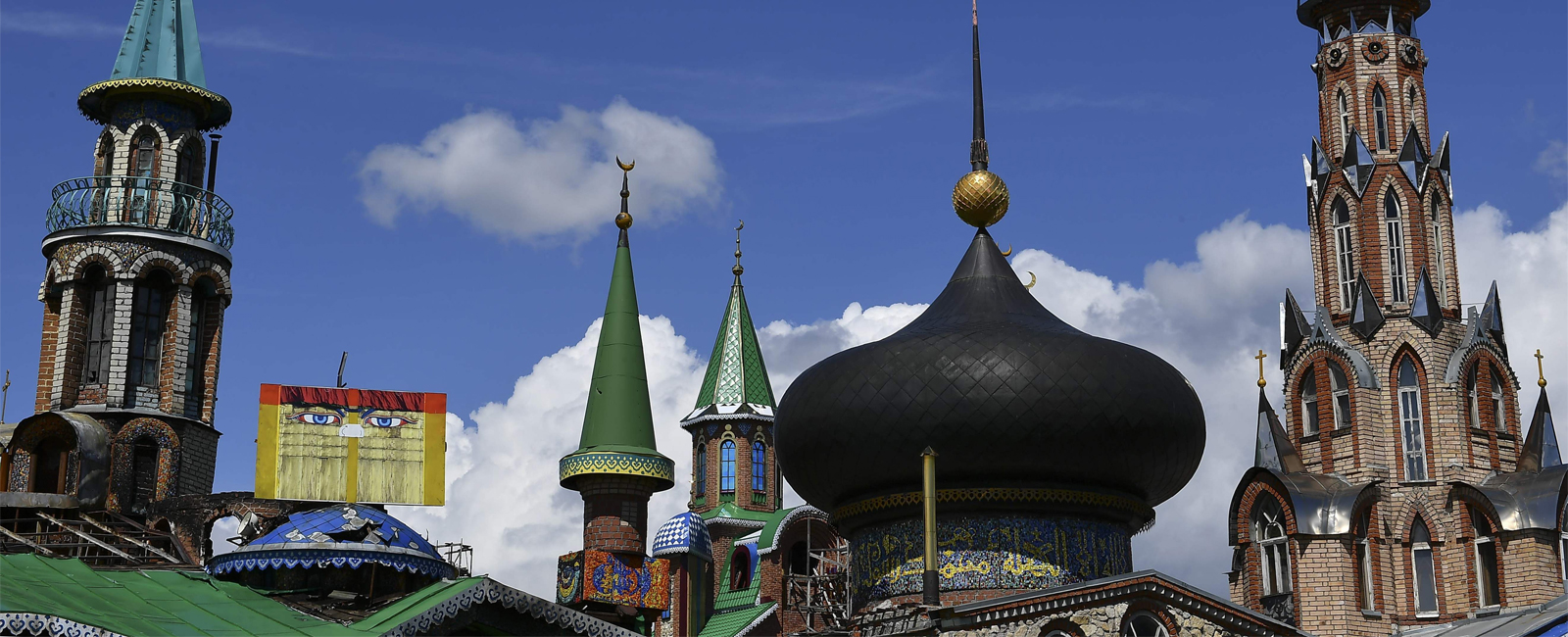Artist's dream of unity alive in Russian 'Universal Temple'
The mosaic-covered jumble of minarets, spires, and onion domes is the eccentric creation of local artist Ildar Khanov

KAZAN: Christian crosses and Islamic crescent moons jut into the sky from the multicoloured roof of the "Universal Temple" in the provincial Russian city of Kazan.
The mosaic-covered jumble of minarets, spires, and onion domes is the eccentric creation of local artist Ildar Khanov, who dreamt up until his death in 2013 of uniting all of the world's major faiths in his childhood home.
Khanov's vision was to foster understanding between religions in Russia's multi-ethnic Tatarstan region – a majority Tartar Muslim area nearly 1,000 kilometres east of Moscow that is a melting pot of different cultures.
Now the job of looking after – and trying to finish – his ambitious project near the banks of the Volga river has fallen to his niece Elvira Galeeva.
"This place was not intended to hold religious ceremonies, it is a symbolic location," Galeeva told AFP during a tour. "He wanted to plant the seeds in people's minds to make ideas of harmony and tolerance grow."
Rococo and Socialist Realism
Khanov's fantasy is a dazzling mixture of kitsch and rococo excess that continually throws up surprises for visitors.
Next to the entrance, there is a turret dedicated to the memory of Mother Teresa. The Catholic room is decked out like a church and the Orthodox Christian section is decorated with wooden walls and icons.
Elsewhere, a work-in-progress Egyptian sphinx stands in an empty building inscribed with Islamic scriptures.
The hot potch is understandable for an artist who was born a Muslim but grew up under the state atheism of Soviet rule.
Some of the friezes and decorations are clearly influenced by the Communist-era genre of Socialist realism and reference 20th-century horrors such as the bombing of Hiroshima.
After the collapse of the Soviet Union, the idea to transform his former family home reportedly came to Khanov in a vision.
"One night Christ came to me and said 'You will wake at dawn, get a shovel from the shed, and start work on a universal temple," he told France's Le Figaro newspaper in 2012 before his death at the age of 72.
Originally, the artist had even more grandiose plans and wanted to build an entire town with the world's biggest Holocaust memorial. For now, his creation has only rooms to seven of the 16 major faiths he intended to honour.
Volunteer workers who helped build the temple are still busy at the site.
'Another sort of union'
The striking building is a tourist draw for those coming to Kazan and should attract more attention as the city hosts the Confederations Cup football tournament this month and the World Cup in 2018.
At a time of religious tensions around the globe and when Moscow is locked in its worst standoff with the West since the Cold War over the Ukraine crisis and Syria, some say the temple's message is more important than ever.
"When the political situation is tense, then it is important to think about something more elevated where people of different religions can unite," said visitor Roman Butyn from Siberia.
"Today, we are all linked by the internet but here there is another sort of union thanks to religion," chimed in his companion Nadezhda Miloserdova.
Sadly, however, even this symbol of harmony has not escaped disputes.
Some two months ago, a fire tore through the building, damaging the Buddhist section, a tower dedicated to Judaism, a theatre room, and a library.
Galeeva said a police investigation is under way and that the blaze could have been due to an arson attack linked to a family disagreement.
But despite the setback, she is hopeful that the temple will eventually be completed along the lines envisioned by her uncle.
"We would like to make a cultural and education centre and to realise the dream of Ildar Khanov," she said. "This will take years, maybe all of our lives."
—THUMBNAIL: A photo taken on June 24, 2017, shows a small a sculpture of Egyptian pharaoh Tutankhamun at the "Universal Temple" in Kazan, Russia. AFP/Yuri Cortez





